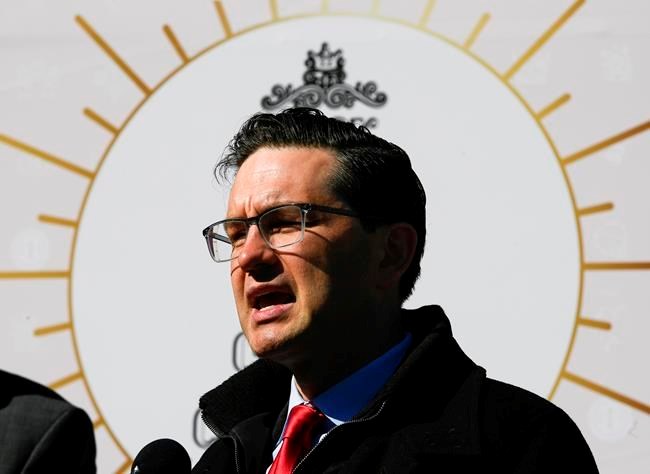OTTAWA — The last time federal Conservatives were picking a leader, their race was transformed by the COVID-19 pandemic.
More than two years later, they are at it again. But this time, the race is happening during what appears to be the end of Canadians living under government-imposed pandemic rules.
The events of the past 25 months, from when the health crisis first landed until now, are shaping the contest for who will lead the Conservative party after Sept. 10.
“The whole concept of talking about freedom is definitely a direct result of the pandemic," said Chris Chapin, a managing principal at the Upstream Strategy Group, who worked on past leadership campaigns for Ontario Progressive Conservative candidates.
Longtime party MP Pierre Poilievre is running a campaign vowing to make Canada the "freest nation on earth." Opposing mask and vaccine mandates has been a large part of his message, which he has delivered to crowds that have at times swelled into the thousands.
Last week, he took his stump speech to a largely unmasked crowd of more than 250 people who packed into a hotel conference room in western Quebec, where a mask mandate was still in effect.
Chapin said Poilievre has clearly tapped into the angst people have felt living in the pandemic, including those in big rigs who rolled into Ottawa over the winter and refused to budge from downtown streets for weeks, demanding all COVID-19 rules end.
Leslyn Lewis, the third-place finisher in the 2020 race, has also been campaigning against mandates.
She's also publicly opposed Canada signing on to a World Health Organization treaty, which she suggested to supporters in a recent email would threaten the country's "national health sovereignty."
The governing body of the WHO has launched a process to draft and negotiate an international agreement to strengthen pandemic prevention, preparedness and response.
In another message, Lewis said she refuses to disclose her vaccination status "as a matter of principle" and promised to introduce legislation to protect those who choose to remain unvaccinated from "discrimination" if she were to win power.
Chapin added that Brampton, Ont., Mayor Patrick Brown's championing of religious freedom also likely resonates with those who spent months unable to attend church under pandemic rules.
For both Chapin and longtime Conservative strategist Melanie Paradis, who is remaining neutral in the race, most of the meaning behind candidates' anti-mandate messaging boils down to selling memberships.
The deadline for candidates to sign up supporters as party members is June 3.
Paradis said focusing on mandates is an effective way to gain traction in a leadership contest. But the party risks expending too much energy on pandemic policies that are no longer in effect and that wider Canadian society has moved on from, at a time when the party needs to broaden its voter coalition, she said.
“We’re putting so much emphasis on these issues that are not going to matter at all by the time we get to a general election," she said.
“It’s actually completely un-strategic."
Besides selling memberships, some candidates are also campaigning off COVID-19 for cash.
One example is Roman Baber, the Independent MPP from Ontario who rose to prominence after getting booted from Doug Ford's Progressive Conservative caucus for speaking out against COVID-19 lockdowns.
Without much name recognition, Baber, who was first elected to provincial politics in 2018, successfully raised the $300,000 and garnered the 500 nomination signatures the party required to be on its final ballot.
"My detractors say I'm running on COVID and that's over," Baber recently tweeted. "Really? Millions of Canadians are still subjected to unprecedented discrimination."
Another outsider whose name could appear on the final ballot is Joseph Bourgault, a businessman from rural Saskatchewan. He travelled to Ottawa as part of the "Freedom Convoy" and recently appeared in a photo with Chris Barber, one of the organizers now facing charges for his role in the protest.
Former NHL player Theo Fleury, whose social media feeds are filled with anti-vaccination statements, has been campaigning for Bourgault. The candidate touts medically disproven alternative treatments for COVID-19 such as ivermectin and hydroxychloroquine with zinc.
"These are the messages that I'm getting out there and it's resonating with Canadians," Bourgault said earlier this week.
Conservatives are picking a new leader because Erin O'Toole was tossed from the job in early February by majority vote from the party's MPs, not long after the convoy arrived.
O'Toole's muddled response to the protest was for some in caucus — and the wider party membership — the last straw in what they saw as his apparent reluctance to take a forceful enough stand against vaccine mandates.
O'Toole's struggle with the issue emerged during last fall's federal election, which he entered after spending nearly his entire tenure leading the party virtually due to COVID-19 lockdowns.
Even once the campaign got underway, he decided to forgo much of the traditional hand-shaking and in-person events for virtual appearances from a hotel ballroom, which the party transformed into a state-of-the-art broadcast studio.
For John Aladin, a 22-year-old immigrant from Haiti living in Quebec, it was Poilievre's consistent message as a Conservative that drew him in, which he found important after what he calls O'Toole's "wishy-washy" stance on the pandemic.
"If (Poilievre) had been the leader at the time, it would have more clear as to where the party (stood)."
Aladin was among those who stood in line waiting to speak with Poilievre at his event in western Quebec last week.
After doing so, he decided to take out a membership and offer up his name to volunteer.
This report by The Canadian Press was first published May 1, 2022.
Stephanie Taylor, The Canadian Press




